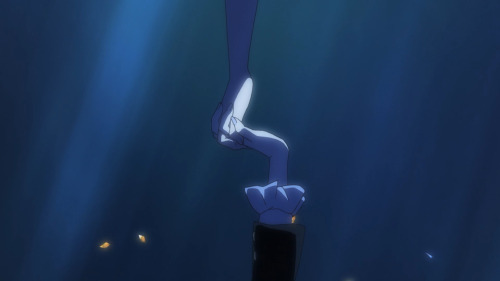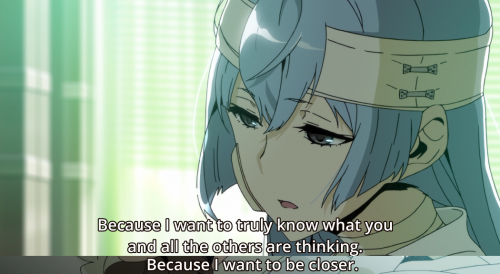character development: sins & virtues
So I was talking with @m-arichat the other day and we ended up discussing how each character showed the “virtue” opposite to their “original” sin. @theanimulyfe already has a great (!!) post about it, but it’s really interesting to take a second look now that the series is over, IMO!
As you know, Noriko herself said that the gang doesn’t actually “live up to their sins”. Which is to be expected, because their sins didn’t reflect their real selves: on the contrary, they only obscured them, because—with the exception of Katsuhira and Hisomu—they were mostly just façades or approaches they took to face the world and keep themselves from being hurt.
But what I love about all this is that while the cast was introduced by presenting us their flaws, Trigger made sure they would show the opposite behavior in the finale.
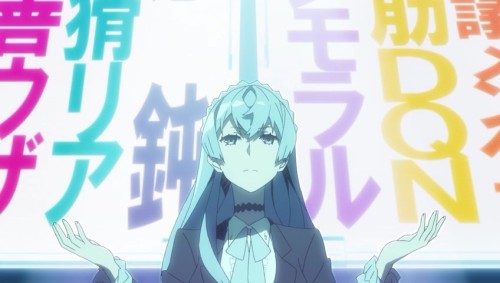
Warning: Image heavy!!
Katsuhira
The ‘Imbecile’ & Sloth → Diligence
Katsuhira was ‘The Imbecile’ because he couldn’t understand himself nor others, and ‘Sloth’ because he simply left things at that and went with the flow. In order to overcome both of his sins, Katsuhira had to be diligent and steadfast. On one hand, Katsuhira had to act out of his own volition and beliefs rather than out of those of others.
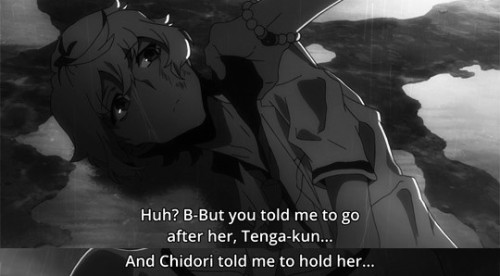
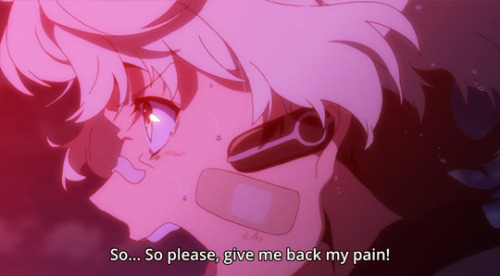
On the other (and most importantly), Katsuhira had to think about himself and others properly and not give up before coming to a conclusion. In other words: grow to understand himself and others through sheer effort.
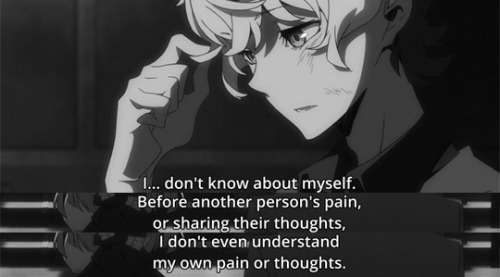
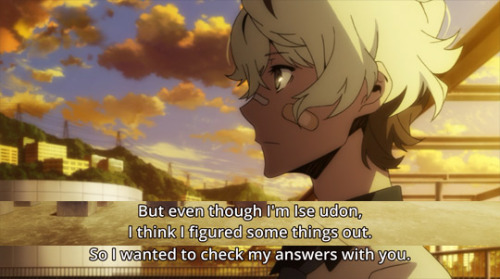
And we saw him do just that through the series, with his development reaching a peak in Episode 11 and bearing fruits in Episode 12, in which the gang confirms Katsuhira was right (they are indeed friends), and Katsuhira is able to understand the nature of his feelings for Noriko and Noriko’s own feelings towards him and Asuka-tachi.
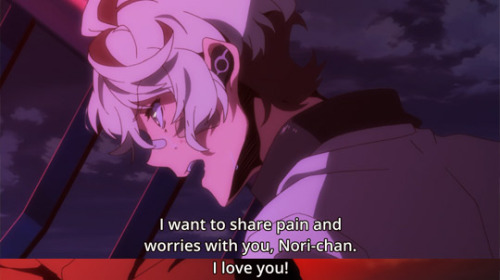
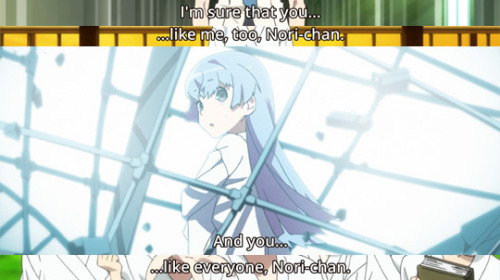
304Please respect copyright.PENANAWbg00bxQzO
Chidori:
The ‘goody-two-shoes’ / ‘Annoyingly Self-righteous’ & Envy → Kindness
While Chidori could fit either ‘Greed’ or ‘Envy’—both solely due to the self-centered approach she unconsciously took concerning her feelings for Katsuhira—I personally lean more towards Envy, because a great amount of focus is spent on Chidori’s reactions to Noriko being on the receiving end of Katsuhira’s attention.
Chidori’s feelings do start off as jealously because she feared Noriko would take what she most likely saw as her ‘rightful’ place by Katsuhira’s side.
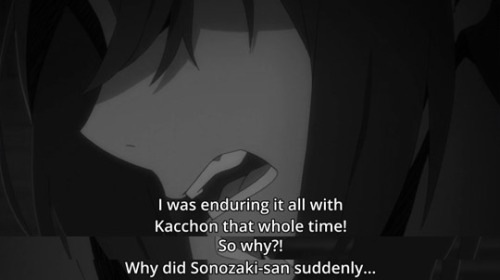
However, by Episodes 9 it becomes obvious that Chidori already saw Noriko as ‘being in the lead’, so to speak. First, because after Katsuhira takes of running Chidori immediately assumes he’s left to be by Noriko’s side (“He went to Sonozaki-san.”). Then, because of this:
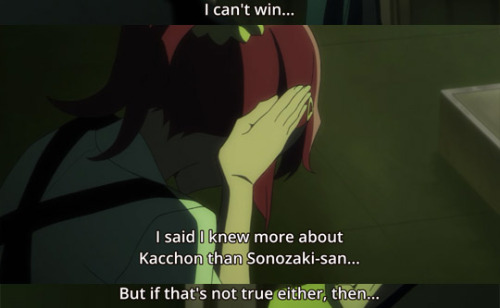
And third, because Chidori doesn’t only ask Katsuhira to hold her. She wanted to be held “like you held Sonozaki-san.” In other words, Chidori was aching for what she felt Noriko already had—Katsuhira’s attention, Katsuhira’s romantic love—which is Envy rather than simple Jealously. This is another reason why Chidori was so self-centered in regards to Katsuhira: she wasn’t simply wishing Katsuhira would love her back, she wanted to ‘win’ Katsuhira’s heart instead of Noriko. Something illustrated by one of the meanings of her flowers in the ending: ‘Victory of (romantic) love’ and ‘My love is deeper than yours’.
Thus, to overcome her sin Chidori needed to let her kind and nurturing nature shine through specifically in regards to ‘Katsuhira and Noriko’. To be grateful and show “Unselfish love and voluntary kindness without bias or spite”, “Charity, compassion, and friendship for its own sake; empathy and trust without prejudice or resentment” [x].
And Chidori does all that in the finale, because Chidori grows to be grateful for the kind of love Katsuhira does feel for her, to empathize with his feelings for Noriko and selflessly put Katsuhira’s happiness before her own feelings for him.

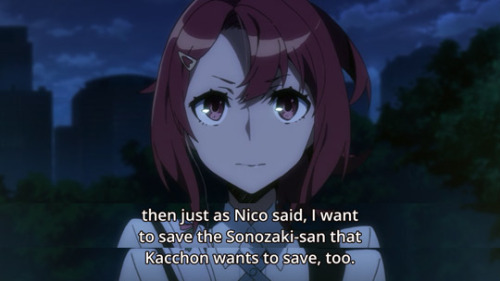
And in doing so, Chidori leaves her envy behind and reaches acceptance, which in turn allows her to start to move on.
304Please respect copyright.PENANAdGP2OlQUtS
Yuta:
The ‘Cunning Normal’ & Gluttony → Temperance
While Gluttony may at first seem to refer to Yuta’s old eating habits, I believe it actually ties in with one of the reasons Yuta used his cunning: to build immediate rapport with others (girls) and thus, to seek self-gratification (to be liked, to fit in) through superficial (quick, not thorough) means. This is revealed in Episode 5 when Yuta tells Honoka that when people get intimate with each other, they should “carry on about how they love each other” even if it’s a lie.
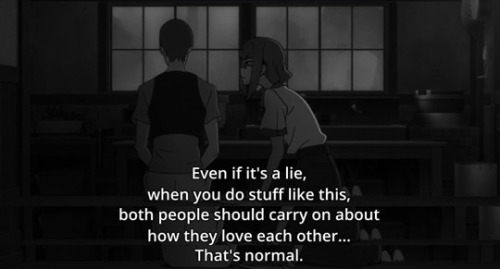
The flipside of Gluttony is Temperance, which is also opposite from being cunning. So what Yuta needed to do was to not act solely according to his own interests, but being mindful of others and being willing to “practice self-restraint” instead of aiming for immediate gratification.
And he accomplished both by being himself rather than relying on his looks for self-gratification:
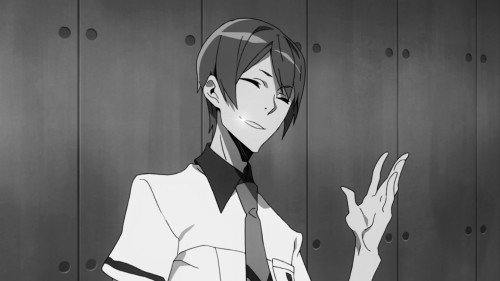
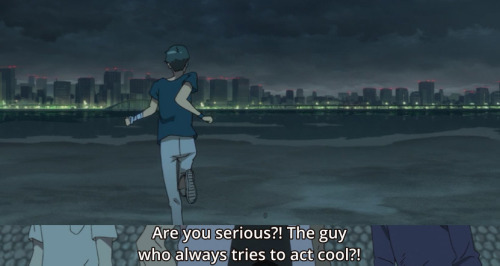
And by being mindful of Honoka’s needs and feelings instead of continuously trying to woo her based solely on her looks, like he kept doing at first.
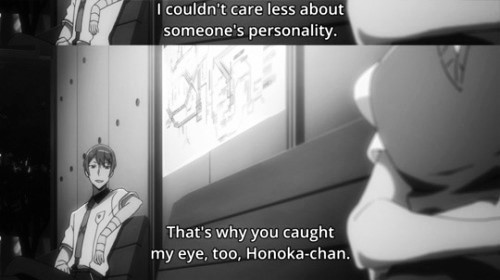
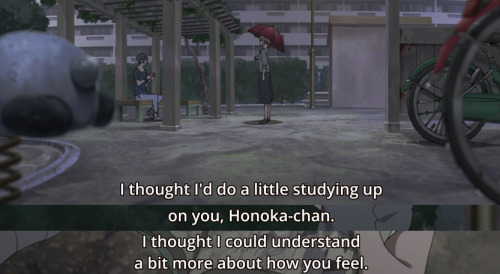
So Yuta’s development was all about no longer settling for immediate yet superficial results, but to instead be willing to invest time into truly getting to know others beyond their looks (particularly, Honoka) and show himself as he truly is, all this in order to build meaningful bonds with others.
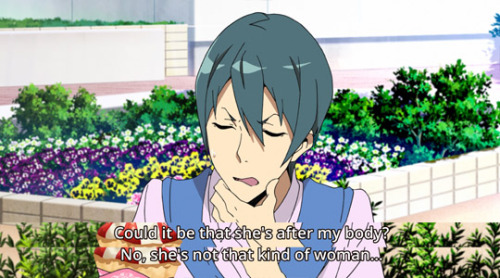
304Please respect copyright.PENANA2o7hDWtnuS
Honoka:
The ‘High and Mighty’ & Pride → Humility
Honoka’s pride didn’t only show in her outward attitude towards others (“No, thanks. I think I’d catch various things just by being around you people.”), but also in her initial refusal to accept the other’s help and admit she does consider them her friends.
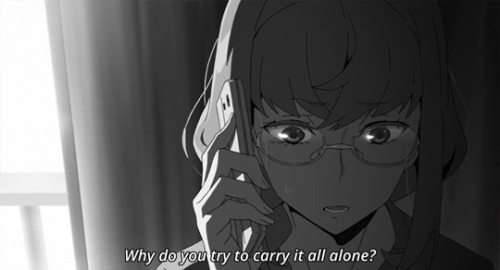
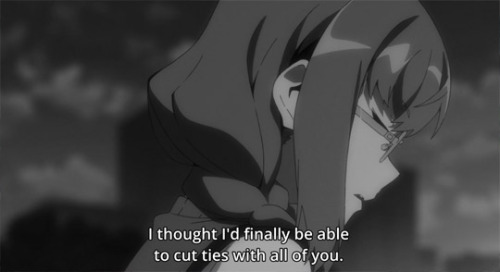
Humility goes even beyond that, however. Because it also involves two lessons that were at the core of Honoka’s character arc:
“Refraining from despair; the ability to confront fear and uncertainty, or intimidation.”
“The courage of the heart necessary to undertake tasks which are difficult, tedious or unglamorous, and to graciously accept the sacrifices involved.”
So what Honoka needed to do was to overcome her fears and uncertainties. To dare to open up her heart, let her barriers down and be willing to “accept the sacrifices involved” in bonding with others: sharing your heart with them and revealing yourself to them.

And Honoka achieves this with flying colors in the final episode because, despite the risk of heartbreak, Honoka still decides to be brave and give herself a chance to love again. Not only through accepting her friendship with the gang (philia),
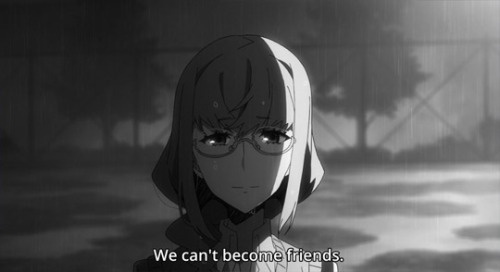
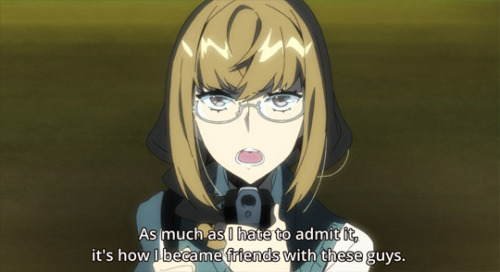
But also through accepting her budding feelings for Yuta (eros).
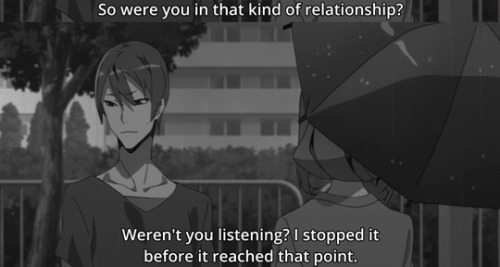
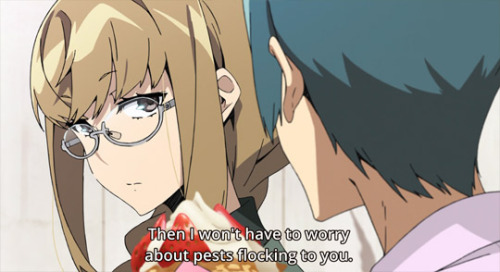
It was necessary for her to embrace both kinds of love because Honoka started the series running away from both (bonding with the Kiznaivers, facing her feelings for Ruru).
Also, just like Chidori, Honoka’s flowers in the ending illustrate this beautifully, because one of them means: Open your closed heart.
304Please respect copyright.PENANAhTUffzjpBv
Nico:
The ‘Eccentric Headcase’ & Greed → Charity
Nico can be either ‘Greed’ or ‘Envy’, depending on which sin you see as Chidori’s. Personally, I consider Nico to be ‘Greed’ rather than ‘Envy’, and I feel it’s corresponding virtue—Charity—fits her perfectly.
Nico is probably the first one to overcome her ‘modern sin’, because after Episode 4 she stops being concerned with being perceived as eccentric or downplaying her intelligence to keep up with the character she built for herself. And it’s then that Nico also starts to leave behind her greed for attention and to stand-out through superficial means (having the title of ‘weirdo’), and pours her heart into bringing the group together instead.
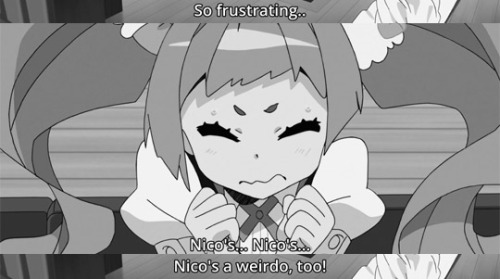
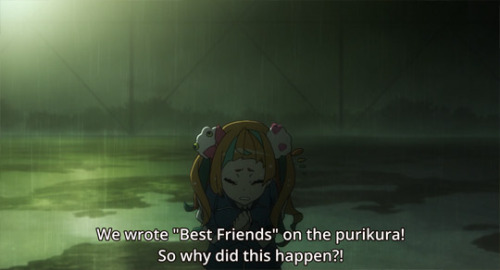
Nico does this out of ‘Caritas’ or “unlimited loving-kindness towards all others”, a kind of love that resides “in the will rather than emotions, regardless of what emotions it stirs up” [x]. And this right here is why Nico’s scenes during the finale are absolutely perfect! First, Nico admits that she may not care about Noriko—but she wants to save her because her friend wants to save her, and then it’s Nico the one to invite Noriko to take pictures with them next time.
But most of all: Nico helps Chidori and Tenga have a moment despite being jealous of it because what she wants the most is for her friends to go back to normal.
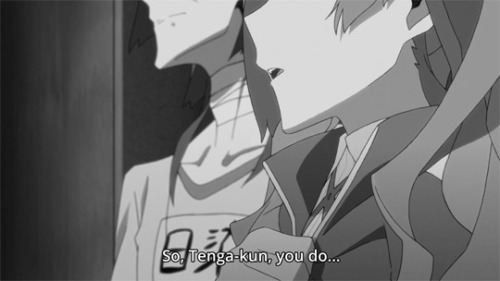
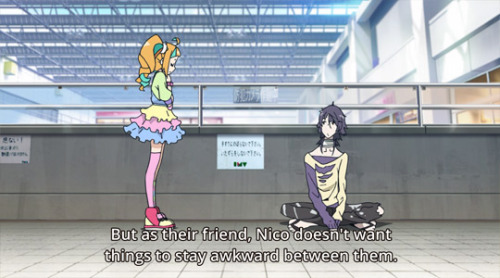
So Nico goes from craving attention to going as far as to willingly and generously helping the boy she loves to enjoy the attention of the girl he loves—all out of love (‘Caritas’, ‘agape’) for her friends. So it’s really fitting that the flower that symbolizes her in the ending means friendship.
304Please respect copyright.PENANA3je0MGtP68
Hisomu:
The ‘Immoral’ & Lust→ Chastity / Purity
Sadly, I don’t have much to say here because both of Hisomu’s sins are probably the ones least explored in the entire show. And to add insult to injury, they were simply treated as a humorous character gimmick whenever they got any sort of spotlight. Still, the contrast between Hisomu when he was introduced and Hisomu by the end of the show is pretty evident!
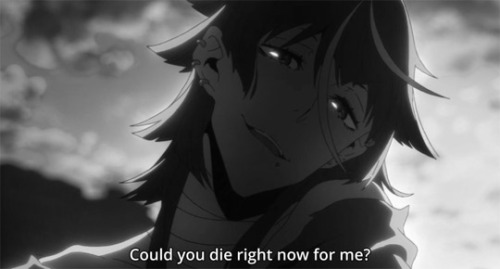
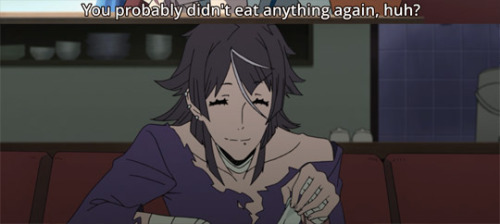
Hisomu’s ‘Lust’ for stimulation took the form of a craving for physical pain, but through the series, we come to see Hisomu finding pleasure in things that are rather pure and far from unacceptable. Namely: becoming friends with the others, helping Katsuhira, bonding with Nico, and seeing the others develop right before his very eyes. In other words, Hisomu’s desire for pain becomes much more moderate, to the point he stops seeking it and instead focuses on giving advice and support to his friends. In this way, Hisomu effectively showed ‘chastity’ and ‘pure’ feelings (not to mention an unwavering loyalty to Katsuhira, which also counters the typical negative connotations of lust).).
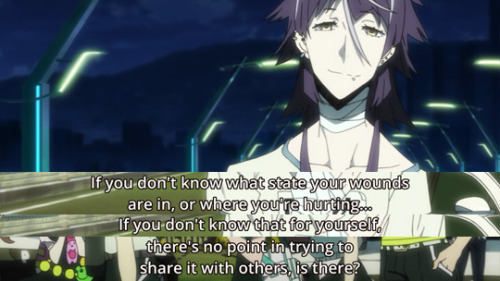
304Please respect copyright.PENANAtRswsjHoG3
Tenga:
Muscle-headed Thug & Wrath → Patience
Tenga’s ‘Muscle-headed Thug’ persona starts to crumble as early as Episode 2, and it continues to do so the more we see just how sensible Tenga can be behind his short-tempered persona. He is considered ‘the group’s mom’ for a reason, after all!
That said, to be honest, I think the show could have done a better job showing Tenga overcoming (or at least, moderating) his ‘wrath’; particularly because he beats those two bullies in both, the first episode and the last, and he doesn’t apologize to Katsuhira for beating him up in Episode 9, either. So my first thought was that there wasn’t that big of contrast in that regard.
However, after some thinking, I realized they probably aimed to show Tenga’s development through his romantic feelings for Chidori—much like how Chidori’s development was shown through her romantic feelings for Katsuhira. So to me, the contrast the show went for in the finale was probably this:

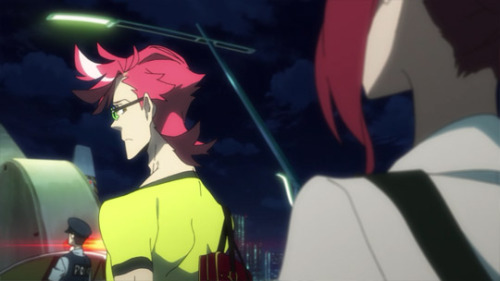
While in Episode 9 Tenga is furious each time Katsuhira inadvertently hurts Chidori by showing his feelings for Noriko, in Episode 12 we see Tenga react in a much more peaceful and respectful manner when Katsuhira reasserts his feelings for Noriko.
Thus, rather than being hasty and acting out of anger or hostility under strain, Tenga showed patient tolerance (and even resignation to the fact Chidori’s feelings are her own and there’s nothing he can do to keep her from hurting.)
Another contrast between ‘Wrath’ and ‘Patience’ is this one:
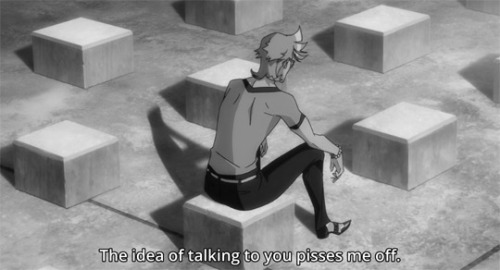
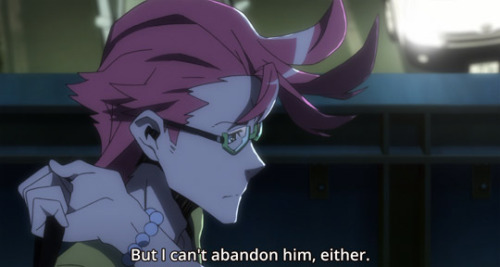
Rather than stubbornly continuing to hold a grudge, Tenga ends up accepting that he still considers Katsuhira his friend and that he can’t abandon him, thus showing (an albeit begrudging) ‘forgiveness’—a virtue that comes with Patience.
Lastly!!
Noriko:
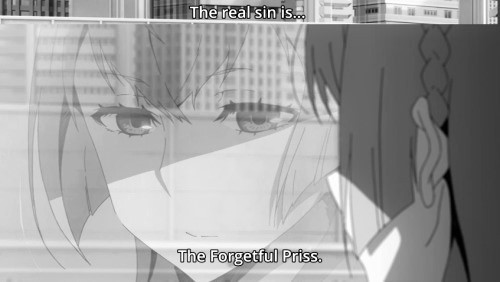
While it’s true that Noriko doesn’t have an official sin assigned to her, I still think she may have been referring to herself when she mentioned ‘The oblivious/forgetful burikko’. And they just so happen to be an 8th sin that existed originally alongside the other seven (and was casually merged into ‘Sloth’, out of all sins): Sorrow, Despair, or Despondency.
I think both of those fit Noriko pretty well: except in Noriko’s case, they don’t refer to the façade she uses to face the world. On the contrary, I’d say they refer to her real self, the self Noriko was out of touch with during the series.
‘The oblivious/forgetful burikko’ because even if Noriko was stuck in the past, she was unable to remember the most important fact of all:
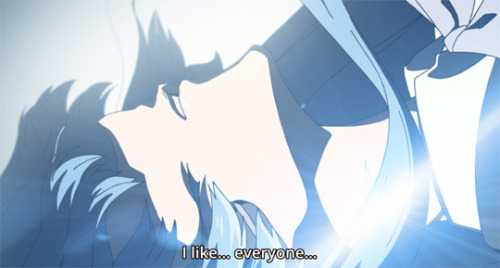
Noriko was unable to remember that what truly powers connections is precisely that: love. And because of it, she was unable to understand herself and others or even remember her true self.
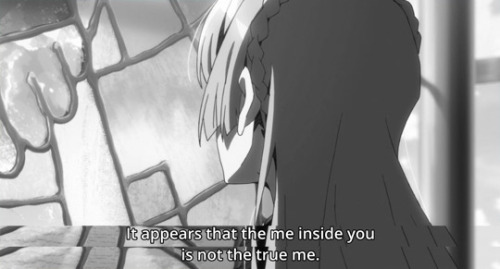
Sorrow, Despair or Despondency because while Noriko may have been under the belief that she was hoping to bring Asuka-tachi back to normal, what she was actually doing deep down is mourn the loss of everyone’s smiles (their happy times together) and despairing that all that was left from her connections to them was the pain within her.

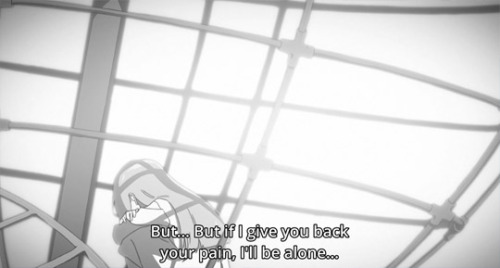
So in order to overcome her sins, Noriko not only had to look within herself and remember her heart—her feelings for others—but also find Hope and act out of it rather than out of desperation and despair—something symbolized by the green roses Noriko holds in the ending, which mean just that: ‘You can have hope.’
And Noriko’s hope comes in the form of believing she can connect and come to know what others are thinking, not through the Kiznaiver System, but through her own means and effort.
